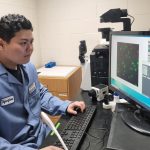Joshua Doloff Receives Grant from Ovarian Cancer Research Alliance

Joshua Doloff, an assistant professor in the Department of Biomedical Engineering and affiliate researcher at the Institute for NanoBioTechnology, has won a three-year, $450,000 grant from Ovarian Cancer Research Alliance to design new drug delivery systems for more precise treatment of ovarian cancer.
Doloff was chosen as one of six junior faculty nationwide to receive the OCRA’s Early Career Investigator Grant. Doloff’s research focuses on exploring the intersection between therapeutics, whether biologic or synthetic in origin, and living systems to better understand what happens when deliverables are introduced into the body and, of major importance, how the host immune system behaves (e.g., helps or interferes with) upon perceiving them. For this project, Doloff and his team are working to develop innovative crystalline drug reservoirs and biomaterial deposition systems to accomplish precision delivery in treating ovarian cancer.
Ovarian cancers result in poor prognoses due to their later-stage diagnosis, invasive nature, and poor therapeutic options. The five-year survival rate for metastatic ovarian cancer is 29%, largely due to tumor cells being shed in the abdomen and causing ascites, or the buildup of fluid in the abdomen. Another major challenge is the safe and effective delivery of drugs to the right tissue at a maintained, effective dose.
“Given these issues, ovarian cancer is well-suited for these collective drug formulation and biomaterial delivery approaches, and this work will lead to better treatment options and outcomes for ovarian cancer patients,” said Doloff.
Crystalline formulations impart long-term, controlled delivery to maintain dosing requirements locally and avoid drug toxicity systemically; ensuring constant release will also improve adherence to therapeutic regimens and overall treatment success. In addition to the drug reservoirs, his team is developing a biomaterial matrix that will provide a controlled release of drugs inward towards the ascites, and not outward into the rest of the body. Together, these systems will not only improve targeted drug placement but will also be instrumental in regaining compartmentalization around ascites that are spreading in an uncontrolled fashion throughout the abdomen.
OCRA is the world’s largest non-government funder of ovarian cancer research and has invested $122 million to support scientific breakthroughs.
Story by the Department of Biomedical Engineering.





